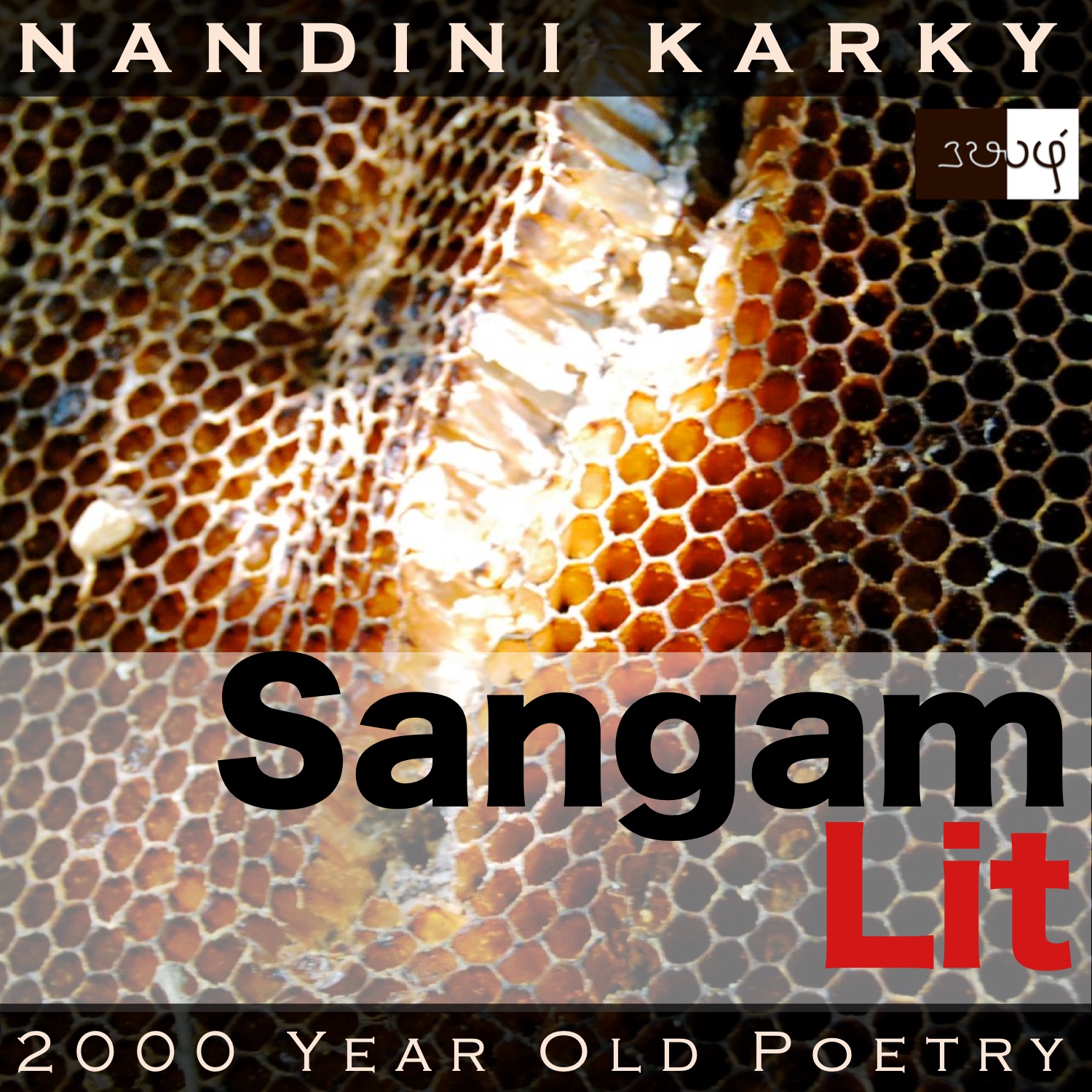Podcast: Play in new window | Download
Subscribe: Apple Podcasts | Spotify | Amazon Music | Android | iHeartRadio | TuneIn | RSS | More

In this episode, we sense the emotions within through a striking simile, as portrayed in Sangam Literary work, Kurunthogai 60, penned by Paranar. Set in the mountains of ‘Kurinji’, the verse speaks in the voice of the lady to her confidante, depicting her angst-filled state after the man’s parting away.
குறுந் தாட் கூதளி ஆடிய நெடு வரைப்
பெருந்தேன் கண்ட இருக்கை முடவன்,
உட்கைச் சிறு குடை கோலி, கீழ் இருந்து,
சுட்டுபு நக்கியாங்கு, காதலர்
நல்கார் நயவார் ஆயினும்,
பல் கால் காண்டலும், உள்ளத்துக்கு இனிதே.
Short legs and tall desires throbs herein! The first few words ‘குறுந் தாட் கூதளி’ dwell on the first part of this theme, for it means ‘short-legged nightshade plant’. Thereafter, we glimpse at ‘பெருந்தேன்’ or ‘a huge honeycomb’. Just as in the case of a recent verse, Kurunthogai 58, here too, a physically challenged person is mentioned in ‘இருக்கை முடவன்’ meaning ‘a seated cripple’. An object is referred to in ‘சிறு குடை’ meaning ‘small cup’, perhaps made of palm fronds for holding food items. A strong ‘even if’ sentiment can be guessed in ‘நல்கார் நயவார் ஆயினும்’ meaning ‘although he doesn’t grace or love’. Ending with the words ‘உள்ளத்துக்கு இனிதே’ meaning ‘pleasant to the heart’, the verse makes us wonder what that joyous thing could be!
Little plants and tall hives seem to beckon us within! The context reveals that the man and lady had been leading a love relationship and they had been trysting for a while. After some time, the man realises the need to gather wealth for their wedding and parts away from the lady. Unable to bear this separation, one day, the lady says to her confidante, “In the tall hills, where the short-stemmed nightshade dances, a seated cripple sighting a huge honeycomb, curves his palms into a small cup, and even as he stays down below, points to the honey above and licks it. Akin to that, even though my lover doesn’t render his graces or his love, just seeing him at times would bring joy to my heart!” With these words, the lady expresses how miserable she feels at not being able to even glimpse at the man now and then.
To unravel the reasons for the lady’s sorrow, let’s follow her words closely. The lady does not start by talking about what she feels within. Instead, she takes us to a scenic spot in the tall mountains, where short-legged nightshade plants are dancing in the breeze. Even as we are delighting in the mountain breeze that swirls around, the lady points to a physically challenged person within that frame. When we turn to look at him, he seems to be looking at something above. As we turn our heads in the direction he’s looking, we spot a luscious honeycomb, oozing with mouthwatering honey. At this time, the lady taps us on the shoulder and points to the person standing below. He has cupped together his palms as if to hold something and then, he points to the honey far from his reach, and makes an action as if, to slurp up that sweet liquid from his empty palms. As we saw in an earlier poem, the helplessness of a physically challenged person is yet again captured acutely. This only goes to show the sympathy in the minds of the Sangam people for the differently abled.
Returning to the verse, the lady has narrated this scene of that person pretending to relish the unreachable honey, only to say, just like that, even though the man showers no grace or love, just seeing him would have brought happiness to her heart. Precisely capturing how helpless she feels, unable to be with the man, she yearns to at least see him. She ends her thoughts with an implied lament that even that wish of seeing her beloved at times is not fulfilled. As in other ‘Aham’ poems, perhaps this expression of yearning will help the lady bear with the separation. Here, I would like to focus on another aspect this verse reveals. This theme of reaching for the unreachable made me think of the well-known fable of the ‘fox and the grapes’. After many an attempt, the fox dismisses the quest as ‘sour grapes’ and walks away. In contrast to this notion, the thought rendered in this Sangam verse, is that, even though something doesn’t fall into one’s hands, the respect for that thing is not diminished. This feeling is echoed by the lady in her wish to see the man even though she feels he doesn’t love or grace her. Herein, the verse seems to point the right path to those hearts that have suffered with unrequited love!




Share your thoughts...